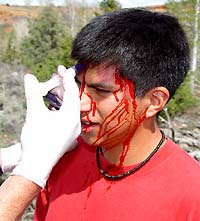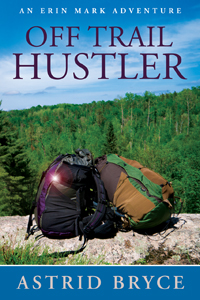
Humans are amazing creatures. We are bundles of contradictions that all coexist at the same time. When we are in our normal daily routine, we crave adventure. But we don’t want to pack for the trip. Once the thrill of the adventure is over, either still on the trip, or once home, we crave to be able to slip back into our normal routine. We don’t want to deal with the clean-up/catch-up. Why is the grass always greener on the other side? And why are transitions so hard?
Earlier this week, I recertified my Wilderness First Responder (WFR). To do so, I spent three entire days outside. Half of that time was spent in scenarios where a portion of the class pretended to be the victim, and the rest of the class broke into small groups to tend to their patient. I did this course through the Wilderness Medicine Institute of NOLS. I have always been impressed by the quality of their classes, including the realism of the scenarios. Stage makeup is always used. If a victim is supposed to be bleeding, there will be blood. If they have a heavy bleed, there will be a lot of blood. If a person had an accident that caused a broken bone or internal bleeding, there will be a bruise. If the patient suffered a burn, the magic of makeup is used to create something that looks pretty nasty. Prosthetics are even used to simulate open fractures or impaled objects.
The heavy use of moulage is done for multiple reasons. The first reason is to reinforce the habit of actually looking at an injury at skin level to assess its severity. If someone says “Ow!” when you touch them, look at the offending body part. Can you see anything wrong? The second reason is to make the scenarios as realistic and grotesque as possible. That way, when a student encounters a real situation, they are not shocked by the amount of blood or the grossness of the disfigurement.
So basically, half of my three day class was spent trying to stress us out. This was purposely done. Similar to military training, if you train correct procedures in a stressful environment, when the actual stressful environment occurs, hopefully your training will kick in and you will follow correct procedures. Of course, here we were trying to save lives through medicine and not take lives through war.
I would say that my course certainly qualified as an adventure. Leading up to it, I was terribly excited to go. I thoroughly enjoyed my time in class. But transitioning back into daily life was kind of rough. I didn’t want to deal with cleaning all the camping gear, processing the backlog of mail, or catching up electronically. I just wanted to be able to slip back into my normal routine.
Ah, but life does not work like that. Just as in my WFR class, certain steps need to be taken, in a certain order. Skipping steps can have undesirable side effects. So, today I will focus on appreciating where I am right now, with the tasks that are before me today. I will not yearn for the adventure of treating wilderness injuries, and I will not yearn for the comfort of a regular day. I will appreciate today for what it is.
Have you struggled with a transition lately? Share your story in the comments below.



My husband Leon and I call it the “Phantom of Suburbia” or the “Doctor Daddy” effect, which is not exactly the same thing but close…it’s easy to immerse oneself in the world of Phantom of the Opera, or Doctor Who, and want to live there…but what if those characters had to deal with the real world like we do? Their lives wouldn’t be all adventure and drama, either. The Doctor would be out of there so fast in his TARDIS! He couldn’t even deal with a long wedding reception, or an afternoon painting. My favorite image of this, courtesy of Leon–that I recall periodically–is of the Phantom with messy hands from a bad diaper change, in full regalia, yelling “Dammit! Be quiet!” as kids run around his underground lair. 🙂
That may not precisely help, but helps me feel less alone in the often literal s&*( of ordinary life and the necessity of dealing with it, in transition or in stasis.
Amy, thanks for your comment. I really like the images you gave. I may not be able to view the Phantom in the same light again.
Hi, Astrid,
Thank you for sharing this. I so resonate with that idea that when we’re in our comfort zones we crave adventure, and when adventure finally comes knocking … we want to cling to our comfort zones. My husband and I are in the middle of “planning” a Memorial Day weekend trip up the Pacific Coast Highway. I am so annoyed at myself for how I am stressing over the details. I want to just let go, treat it as an adventure, have fun. But all these little worries clutter my brain, getting in the way of that “just have fun” attitude. Your post comes at just the right time for me, as I ponder why it’s so dang hard to fly out of your comfort zone, even if only for a few days. Congrats on your certification!
Kate, thanks for the congratulations and sharing with me that my post helped you. That really makes me feel good.
I give you a lot of credit for still planning trips with 1.5 kids. Hopefully, I can follow your example at some point. One thing that helps me “let go” when I start stressing about details is to think of the worst case scenario if the planning doesn’t happen. If I am OK with worst case scenario, often my worries go away and I can treat it as an adventure. If I don’t really like the worst case scenario, I try to do something to change worst case to something I am OK with, be that doing a bit more planning, or throwing a sleeping bag and a bit of food and water in the car.
Good luck this weekend! May your brain relax enough to let you enjoy it.